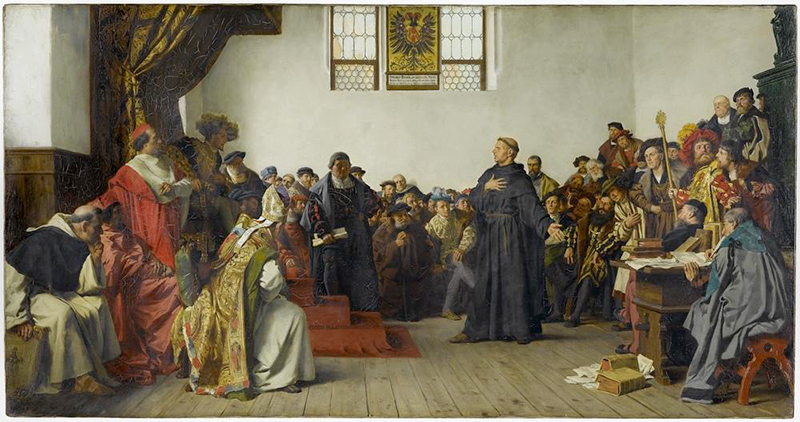
Luther at the Diet of Worms: Anton von Werner, 1877. (State Gallery in Stuttgart).
500 years ago from April 17-18, 1521, Martin Luther appeared before the imperial assembly in Worms, a major event in the history of the church. Dr. Andrea Grünhagen, in charge of the church and theology division at the Hannover headquarters of the Independent Evangelical Lutheran Church in Germany (Selbständige Evangelisch-Lutherische Kirche), explains the significance of this event:
by Andrea Grünhagen

Dr. Andrea Grünhagen
Luther in Worms! It’s easy to imagine this image in your mind’s eye, the lowly monk standing up to the emperor and the assembled leaders. And in general, the life of the Reformer does seem like a series of impressive scenes, each of which seems to serve as an example to be emulated, depending on one’s personal predilection. In humour, one could observe: some think that Lutherans should be able to sing like Luther; or get married like Luther. Others say we should take a firm stand like Luther, always ready to oppose injustice.
But originally it was not a question of opposition, as if Luther was intent to really give the emperor a piece of his mind. It was the other way around. The young Emperor Charles V had opened the imperial assembly in January of 1521. Various problems were to be dealt with concerning the Holy Roman Empire of the German Nation. At the outset the dispute about Luther was not on the agenda. Only at the insistence of Luther’s ruler, Frederick the Wise, did this become a topic to be discussed. And Luther thought he’d be given the opportunity to defend himself and his teachings before the assembly. He had been promised safe conduct. But appearing before this august gathering on April 17, the only question to be dealt with was whether he was willing to recant his writings. No discussion. Yes or No.
After a day of consideration he made the famous statement that ended with these words: “If I am not overcome by the witness of Holy Scripture or on the basis of clear reasoning—for I neither believe the pope nor the church councils alone, since it is evident that they have often been shown to be in error and have contradicted themselves—I therefore remain convinced by my quotations from the Scriptures and with my conscience being captive to God’s Word. I cannot and will not recant, because it is neither certain nor salutary to act against your conscience. God help me. Amen.”
That’s what he said. The famous phrase “Here I Stand” is a rather free summary of his remarks. But the point at hand is not why someone might be convinced that he cannot do otherwise; the point is the conscience that is bound by the Word of God! Everyone must for himself hear and follow this admonition not to act against the conscience that is bound by the Word of God—just as Luther had to struggle with this before the emperor and the nation.
———————
